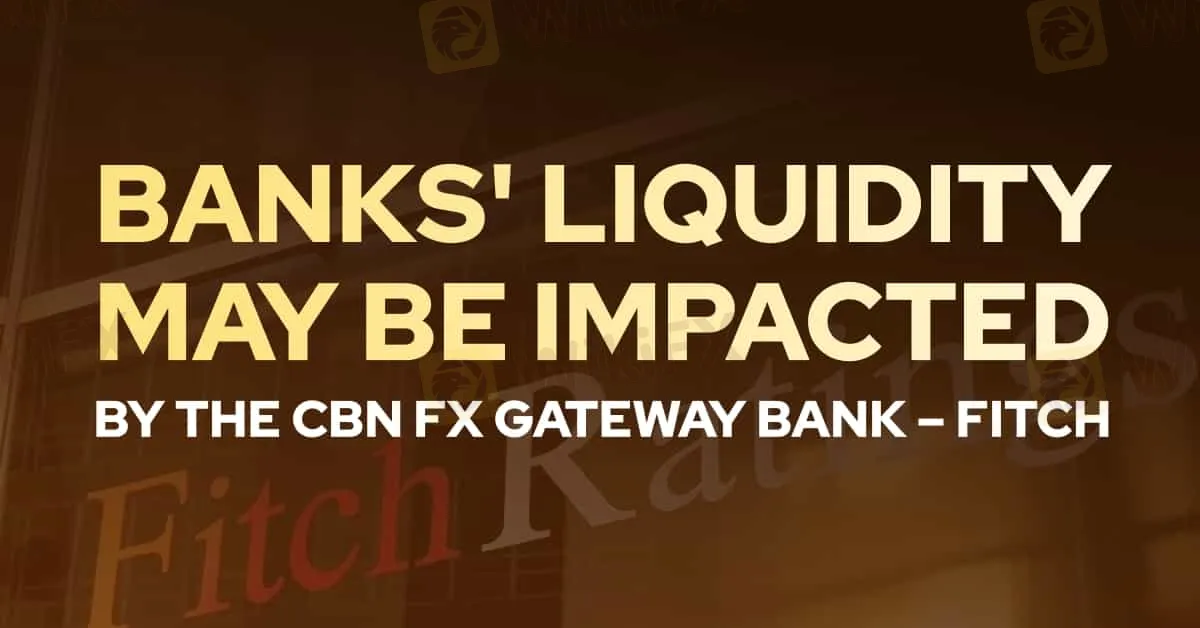简体中文
繁體中文
English
Pусский
日本語
ภาษาไทย
Tiếng Việt
Bahasa Indonesia
Español
हिन्दी
Filippiiniläinen
Français
Deutsch
Português
Türkçe
한국어
العربية
BANKS' LIQUIDITY MAY BE IMPACTED BY THE CBN FX GATEWAY BANK – FITCH
Abstract:According to credit Ratings, the Central Bank of Nigeria's proposed foreign currency gateway bank could negatively impact the liquidity of Nigerian banks.

According to credit Ratings, the Central Bank of Nigeria's proposed foreign currency gateway bank could negatively impact the liquidity of Nigerian banks.
This was revealed in the most recent Fitch Ratings examination of Nigerian banks.
The governor of the apex bank, Dr. Olayemi Cardoso, has announced plans to create a new foreign currency gateway bank in an effort to ease the country's FX issues.
In a televised interview, Cardoso discussed the CBN's plans and said, “Introducing a single FCY gateway bank to centralise all correspondent by two major banks in the corresponding banking space.”
The CBN's medium-term plan, aims to solve Nigeria's ongoing FX issues by centralizing all correspondent banking activities.
In response, Fitch Ratings said, “The Governor of the CBN, Yemi Cardoso, said that there are plans to establish an FC gateway bank with the intention of centralizing correspondent banking activities.” “A recent audit found $2.4 billion of past-due FX forwards invalid.” Fitch believes that the CBN's policies may negatively affect the banking sector's FC liquidity.
Meanwhile, due to the nearly 70% depreciation of the local currency since the end of 2022, Fitch forecasts that bad loans to the banking sector would climb faster than the devaluation. Due to the devaluation, which has increased the already significant ratio of gross loans to core capital and FC-denominated problem loans (Stage 2 and Stage 3 loans, mostly from the oil and gas sector), Fitch predicts that the banking sector's impaired loans (Stage 3 loans) will rise more quickly than it did before.
The CBN circular, which prohibits banks from holding net long foreign currency positions, is expected to result in a further modest depreciation of the naira, according to Fitch.
Not only has the Central Bank of Nigeria issued new circulars, but also depreciated its currency. Following the devaluation, a circular was issued on January 31 which prohibited banks from having net long FC holdings, and set February 1 as the compliance date.
Net long FC positions have mitigated the impact, including the most recent one, on capital ratios because they generate advantages from foreign-exchange revaluation, which buffer the impact of increased FC-denominated assets.
According to the research, banks' capital positions are now more susceptible to Fitch's prediction of a further little depreciation of the naira in net long FC positions, even if total capital adequacy ratios (CAR) regulate minimum norms.
The CBN harmonized the several FX market divisions in June, which caused the naira to come down.
Last year, the local closed for 899/$ at the official market.
The naira saw a second devaluation, according to Fitch, with its value as of February 13 standing at 1,516/$, or around 40% loss.
This exceeded Fitch estimate for 2024. The second in a year—has caused the official exchange rate and the parallel market rate to converge. The continued move away from a long-standing system of beneficial in increasing capital inflows and reducing foreign currency shortages, which have recently impeded economic growth.
However, short-term macroeconomic problems, such as drawing attention to the already inflation (December 2023: 29% year over year), which could impede economic growth and put more pressure on the capital and credit quality of the banking industry.
On Friday, the dollar was sold for 1,537/$ in the official window. It was trading for 1,590/$1 on the parallel market, 1.57 percent less than its closing price of 1,565/$.

Disclaimer:
The views in this article only represent the author's personal views, and do not constitute investment advice on this platform. This platform does not guarantee the accuracy, completeness and timeliness of the information in the article, and will not be liable for any loss caused by the use of or reliance on the information in the article.
Read more

Italian Regulator Warns Against 5 Websites
The Italian regulator, CONSOB has issued a warning against five websites offering unauthorized financial services. This regulatory action aims to protect the public from fraudulent activities.

Trader Exposes Unethical Practices by STP Trading
A recent allegation against STP Trading has cast doubt on the firm's business practices, highlighting the potential risks faced by retail traders in an increasingly crowded and competitive market.

What Makes Cross-Border Payments Easier Than Ever?
Cross-border payments are now faster, cheaper, and simpler! Explore fintech, blockchain, and smart solutions to overcome costs, delays, and global payment hurdles.

FCA Identifies Clone Firm Exploiting Admiral Markets' Credibility
The UK Financial Conduct Authority (FCA) has issued a public warning regarding a fraudulent entity impersonating Admiral Markets, a legitimate and authorised trading firm. The clone firm, operating under the name Admiral EU Brokers and the domain Admiraleubrokerz.com, has been falsely presenting itself as an FCA-authorised business.
WikiFX Broker
Latest News
What Makes Cross-Border Payments Easier Than Ever?
Trader Exposes Unethical Practices by STP Trading
Italian Regulator Warns Against 5 Websites
Currency Calculator


